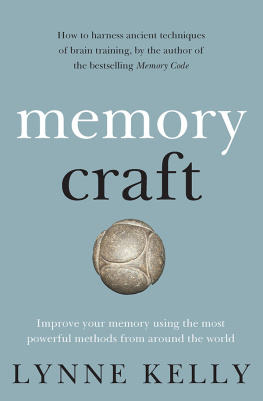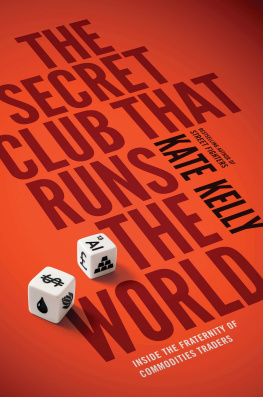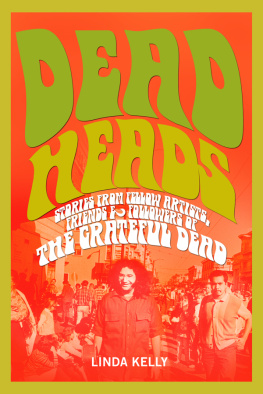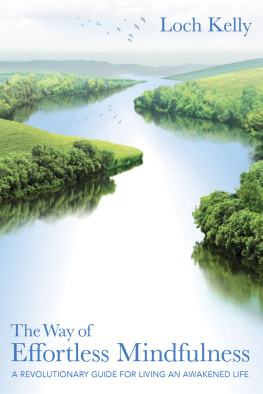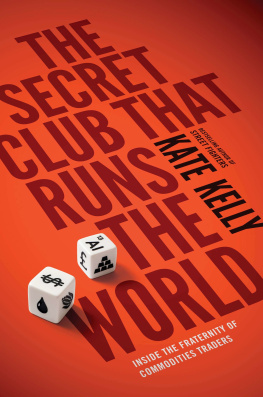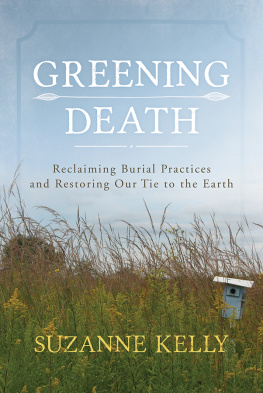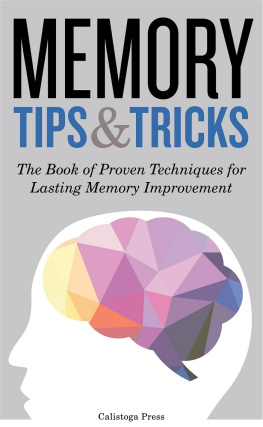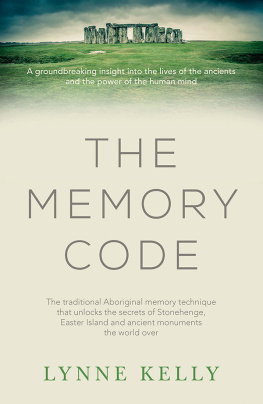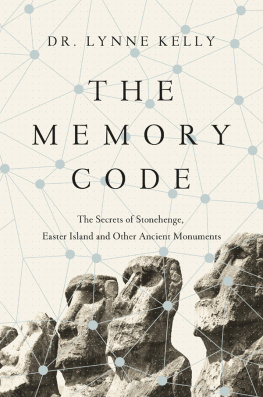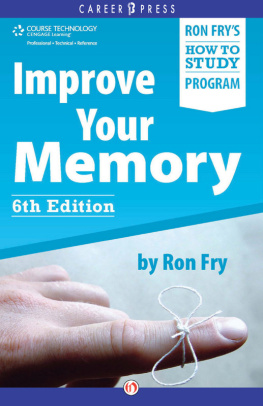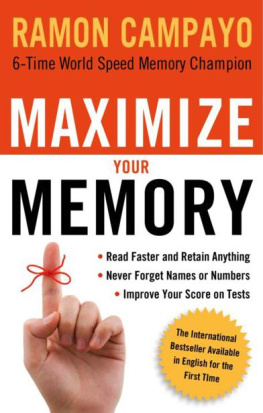Memory Craft provides a comprehensive understanding of mans earliest and most powerful survival tool, memory. Dominic OBrien, eight times World Memory Champion
Memory Craft is essential reading for anyone interested in memory improvement techniques. Highly recommended. Josh Cohen, co-founder, artofmemory.com
If youre looking for a book that is a treasure trove of historical lore about the art of memory, while simultaneously offering up tips and strategies to help you remember better, this is a must-read for you! Nelson Dellis, four times USA Memory Champion
Dr Lynne Kelly explores the ancient memory techniques that exploit our brains natural instinct to ground knowledge in landscapes, movement, objects, stories and songs. Lynne shares her practical experience with using these methods to teach us how we too can memorise anything from the history of the world to learning a foreign language. Along the way we gain profound insights into how these memory crafts can not only inform educational practices, but also potentially protect our memories from decline as we age. Dr Meredith McKague, Melbourne School of Psychological Sciences, University of Melbourne
Entertaining, educational, fun and has easy to follow methods so everyone can learn how to increase their own memory capacity. Carolyn Tavener, Principal, Malmsbury Primary School
Memory Craft is captivating and well worth reading and re-reading. You will discover a wide variety of inventive, fun to use and surprisingly powerful techniques that may very well end up changing your life. Francis Blondin, two times Canadian Memory Champion
A tour de force in memory techniques ranging from medieval mnemonics to the latest strategies and heuristics used by world-leading memory champions. The book shows that memory can be learned and trained with a wealth of examples and routines that can be practised by anyone. Professor Todd Landman, Pro Vice Chancellor of the Faculty of Social Sciences, University of Nottingham
Dr Lynne Kelly is the memory whisperer. A senior memory champion, science writer and Honorary Research Associate at La Trobe University Melbourne, she is author of the ground-breaking book The Memory Code.

Other books by Lynne Kelly
Crocodile: Evolutions greatest survivor
Exploring Chaos and Fractals (co-authored)
Knowledge and Power in Prehistoric Societies
The Memory Code
The Skeptics Guide to the Paranormal
Spiders: Learning to love them
First published in 2019
Copyright Lynne Kelly 2019
All rights reserved. No part of this book may be reproduced or transmitted in any form or by any means, electronic or mechanical, including photocopying, recording or by any information storage and retrieval system, without prior permission in writing from the publisher. The Australian Copyright Act 1968 (the Act) allows a maximum of one chapter or 10 per cent of this book, whichever is the greater, to be photocopied by any educational institution for its educational purposes provided that the educational institution (or body that administers it) has given a remuneration notice to the Copyright Agency (Australia) under the Act.
Allen & Unwin
83 Alexander Street
Crows Nest NSW 2065
Australia
Phone: (61 2) 8425 0100
Email:
Web: www.allenandunwin.com

ISBN 978 1 76063 305 9
eISBN 978 1 76087 140 6
Set by Midland Typesetters, Australia
Cover design: Christabella Designs
Cover photo: Carved stone ball held by the Hunterian at the University of Glasgow (Damian Kelly)
For Damian Kelly
and Rebecca, Rudolph, Abigail and Leah Heitbaum.
And for the thousands of students who have been in my classrooms over my long career. From you I learned so much.


I was blessed with an appallingly bad memory. I say blessed, because if it wasnt for this fact I would have never asked the question that changed my life: How the hell did they remember so much stuff?
About ten years ago, I wanted to write a book about animal behaviour and wondered how much more I might observe when watching birds and mammals and insects and my beloved spiders if I did so having read indigenous stories about these animals. La Trobe University had given me a PhD scholarship to research and write the book. My publisher was interested in publishing it. Lovely! Then I derailed the whole project by asking myself that simple question when I realised just how much practical stuff was stored in the memory of indigenous elders.
The Navajo kept a field guide to over 700 insects in memory. Only ten were critical, because they annoyed stock or messed with their crops. One they ate, the cicada. All the rest were known because the Navajo, like all humans, are curious and value knowledge for knowledges sake. In the Navajos stories the insects often act as metaphors to reflect upon human origins and behaviour. And thats just insects. Add the information about all the other animals, a thousand or so plants, complex genealogies, geology and astronomy, land management, navigation, timekeeping and weather and seasons the list goes on and on.
The important lesson for all of those wanting to memorise huge amounts of information is that the Navajo store this knowledge in their mythology. In stories. Vivid lively stories make information more memorable.
And then it gets even more astounding. Recent research on Australian Aboriginal stories about landscape changes shows that the knowledge can be reliably dated to at least 7000 or even 10,000 years ago, and probably even longer. Ten thousand years ago is a really long time before the Egyptian pyramids and Stonehenge. Aboriginal stories tell exactly what happened to the landscape after the last ice age. I was astonished that they could retain information so accurately over such an incredibly long passage of time.
Indigenous cultures relied on their memories to store all the information on which they depended, both physically and culturally. Right into the Middle Ages and Renaissance, Western students were also taught to train their memories. It is only in the last few hundred years of Western society that we have lost the ability to memorise vast amounts of information. We use writing and technology to do the job for us. But memory, writing and technology can all enhance each other. This book is about how to do just that. I want to convince you that learning the memory arts is hugely worthwhile and great fun.
The memory methods used by indigenous cultures the world over have a great deal in common. If these memory methods are so effective and universal, they must be directly related to the way the brain works. It is the only common factor. And even more exciting, especially for someone over 60, as I am, is that current neuroscience research on the plasticity of the brain indicates that it doesnt have to decline with age.
I am convinced that we are very much poorer for not using our memories effectively anymore. Could this be a contributing factor to the prevalence of dementia and the general acceptance that memory fades with age? Or does it in fact fade with lack of use?

